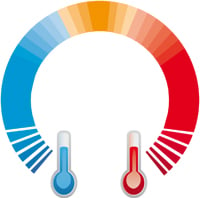 Conventional air conditioning systems are big fossil fuel consumers, but today there are alternatives that can deliver big savings in fuel consumption and running costs. Energy can be found in water, in the air and in the ground, and with the right technologies it can be harnessed to heat and cool buildings.
Conventional air conditioning systems are big fossil fuel consumers, but today there are alternatives that can deliver big savings in fuel consumption and running costs. Energy can be found in water, in the air and in the ground, and with the right technologies it can be harnessed to heat and cool buildings.
Store excess energy in the ground for later use
Hot summers and cold winters usually mean hefty air conditioning bills, but it need not be so. The ground can be used to store energy deriving from excess heat in the summer and cold in the winter. The energy temporarily stored in the ground can then be used for heating and cooling as required. As with all good things, there are upsides and downsides to this method:
The advantages:
• There is no (or very little) need for fossil fuels for winter heating and summer cooling;
• The constant temperature of the ground makes the system energy efficient;
• The energy is easily converted by a heat pump.
The drawbacks:
• A possibility of environmental impact due to ground temperature or moisture distribution changes.
• The initial investment and maintenance costs are high. However, if a big enough number of users can pool together to adopt ground source storage collectively, the investment becomes viable.
Source energy from the air
The air can be another alternative source of energy. It requires no fossil fuels and can be used in conjunction with green electricity, using a heat pump to convert the energy.
This solution requires a smaller investment than ground storage. On the other hand, air temperature is not constant, and when it remains below 5oC for any length of time, the technology becomes very inefficient. However, in the UK temperatures remain above this threshold for the greater part of the year, so it doesn’t need to be an issue.
These alternative solutions are well worth considering, carrying out a careful costs/benefits analysis to determine the system that will bring the greatest advantages in terms of installation and running costs.
 Paul Compton is Technical Director for Colt, experienced in smoke control, HVAC, solar shading and louvre systems.
Paul Compton is Technical Director for Colt, experienced in smoke control, HVAC, solar shading and louvre systems.


